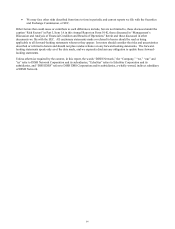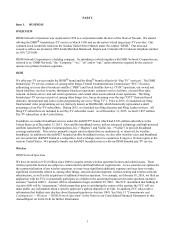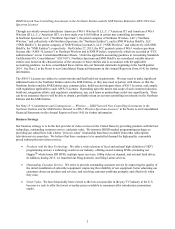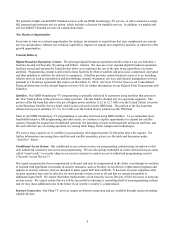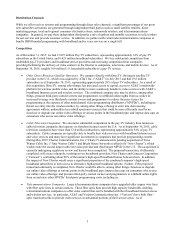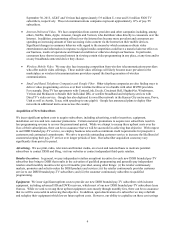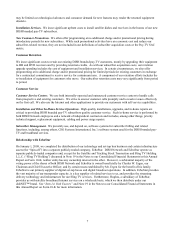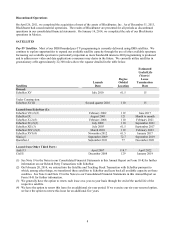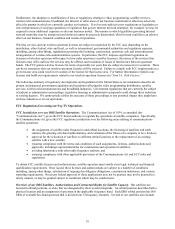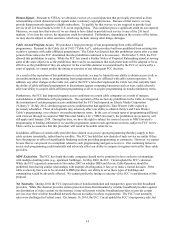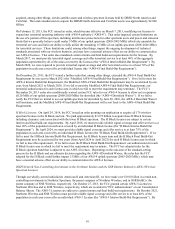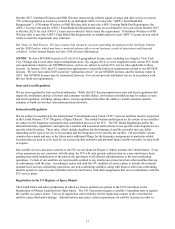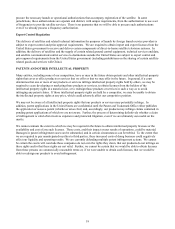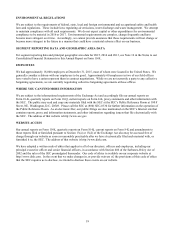Dish Network 2015 Annual Report Download - page 20
Download and view the complete annual report
Please find page 20 of the 2015 Dish Network annual report below. You can navigate through the pages in the report by either clicking on the pages listed below, or by using the keyword search tool below to find specific information within the annual report.10
Furthermore, the adoption or modification of laws or regulations relating to video programming, satellite services,
wireless telecommunications, broadband, the Internet or other areas of our business could limit or otherwise adversely
affect the manner in which we currently conduct our business. If we become subject to new regulations or legislation or
new interpretations of existing regulations or legislation that govern Internet network neutrality, for example, we may be
required to incur additional expenses or alter our business model. The manner in which legislation governing Internet
network neutrality may be interpreted and enforced cannot be precisely determined, which in turn could have an adverse
effect on our business, financial condition and results of operations.
Wireless services and our wireless spectrum licenses are subject to regulation by the FCC and, depending on the
jurisdiction, other federal, state and local, as well as international, governmental authorities and regulatory agencies,
including, among other things, regulations governing the licensing, construction, operation, sale and interconnection
arrangements of wireless telecommunications systems. In particular, the FCC imposes significant regulation on
licensees of wireless spectrum with respect to how radio spectrum is used by licensees, the nature of the services that
licensees may offer and how the services may be offered, and resolution of issues of interference between spectrum
bands. The FCC grants wireless licenses for terms of generally ten years that are subject to renewal or revocation. There
can be no assurances that our wireless spectrum licenses will be renewed. Failure to comply with FCC requirements in a
given license area could result in revocation of the license for that license area. For further information related to our
licenses and build-out requirements related to our wireless spectrum licenses see “Item 1A. Risk Factors.”
The following summary of regulatory developments and legislation in the United States is not intended to describe all
present and proposed government regulation and legislation affecting the video programming distribution, satellite
services, wireless telecommunications and broadband industries. Government regulations that are currently the subject
of judicial or administrative proceedings, legislative hearings or administrative proposals could change these industries
to varying degrees. We cannot predict either the outcome of these proceedings or any potential impact they might have
on these industries or on our operations.
FCC Regulations Governing our Pay-TV Operations
FCC Jurisdiction over our DBS Satellite Operations. The Communications Act of 1934, as amended (the
“Communications Act”), gives the FCC broad authority to regulate the operations of satellite companies. Specifically,
the Communications Act gives the FCC regulatory jurisdiction over the following areas relating to communications
satellite operations:
x the assignment of satellite radio frequencies and orbital locations, the licensing of satellites and earth
stations, the granting of related authorizations, and evaluation of the fitness of a company to be a licensee;
x approval for the relocation of satellites to different orbital locations or the replacement of an existing
satellite with a new satellite;
x ensuring compliance with the terms and conditions of such assignments, licenses, authorizations and
approvals, including required timetables for construction and operation of satellites;
x avoiding interference with other radio frequency emitters; and
x ensuring compliance with other applicable provisions of the Communications Act and FCC rules and
regulations.
To obtain FCC satellite licenses and authorizations, satellite operators must satisfy strict legal, technical and financial
qualification requirements. Once issued, these licenses and authorizations are subject to a number of conditions
including, among other things, satisfaction of ongoing due diligence obligations, construction milestones, and various
reporting requirements. Necessary federal approval of these applications may not be granted, may not be granted in a
timely manner, or may be granted subject to conditions which may be cumbersome.
Overview of our DBS Satellites, Authorizations and Contractual Rights for Satellite Capacity. Our satellites are
located in orbital positions, or slots, that are designated by their western longitude. An orbital position describes both a
physical location and an assignment of spectrum in the applicable frequency band. Each DBS orbital position has 500
MHz of available Ku-band spectrum that is divided into 32 frequency channels. Several of our satellites also include


